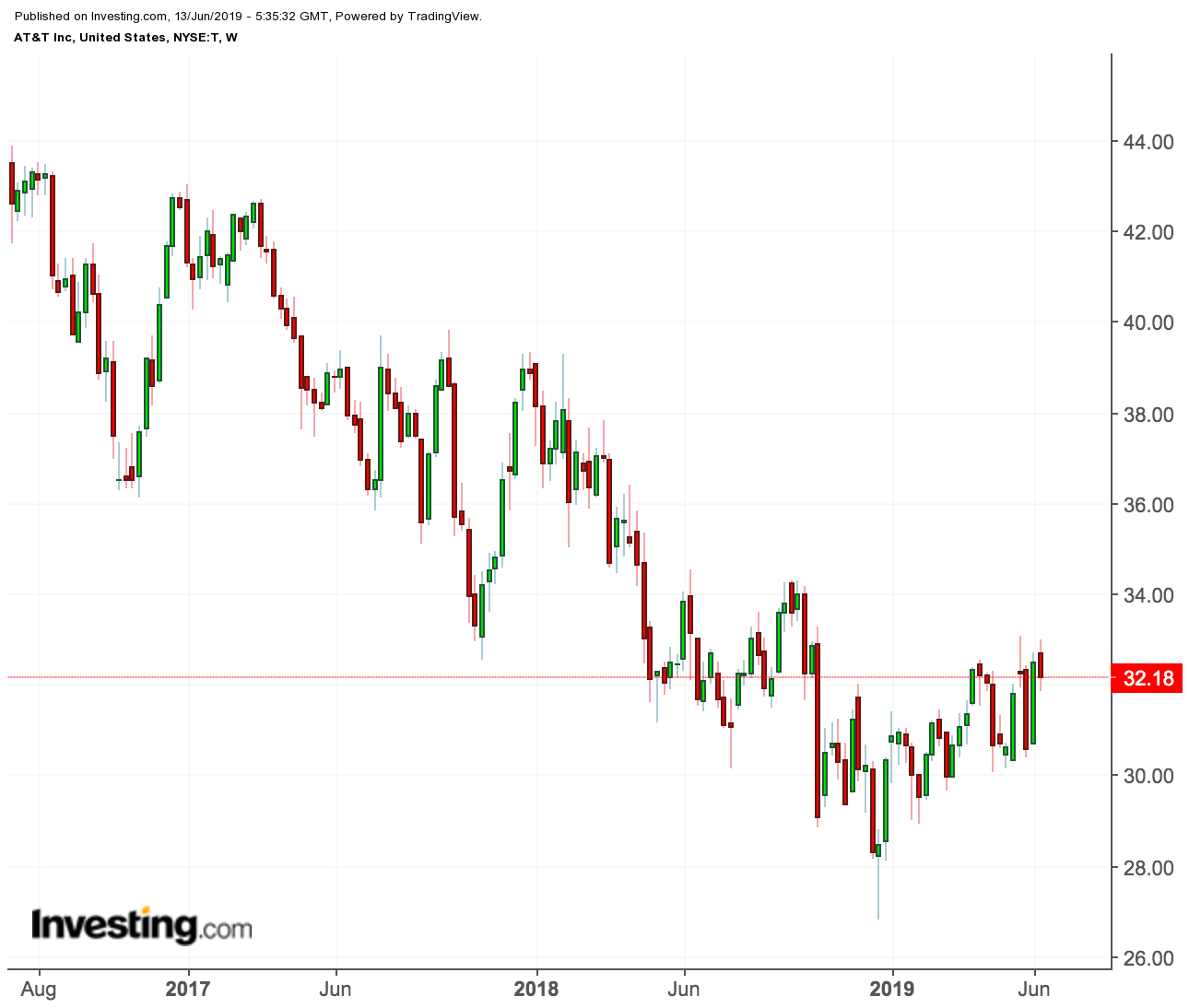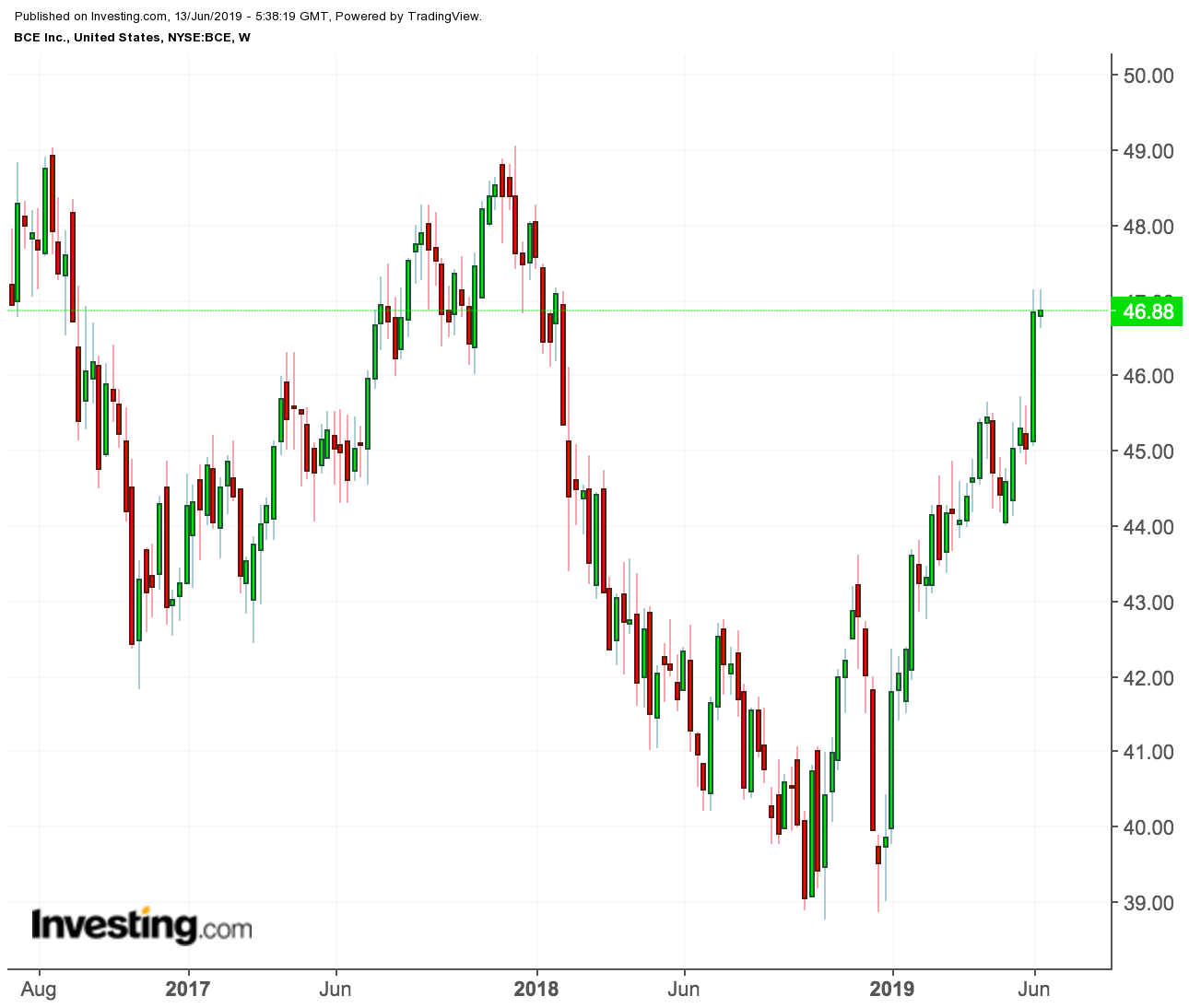As expectations of an interest-rate cut by the Federal Reserve swell, stocks that pay dividends are becoming attractive again.
Going by the pricing of futures contracts, the market expectation is for the top end of the funds rate range to fall from its current 2.5% to 1.5% by 2021. As of June 10, the market was reflecting a 98.1% chance of some kind of cut by the end of 2019, according to Bloomberg data.
As a result of these dovish expectations the yield on the U.S. 10-year Treasury bond has fallen to 2.42%, a sharp reversal from six months ago when it was trading around 3%. By contrast, the dividend yields of North America’s two largest telecom utilities, AT&T (NYSE:T) and BCE Inc. (NYSE:BCE), are worth looking at: AT&T’s annual dividend yield is just over 6%, while BCE, Canada’s largest telecom operator, is yielding more than 5%.
These returns look very appealing in the prevailing rate environment, offering more than three times the yield from the safe haven government bonds. But before you make that decision, you need to figure out if these investments are safe. Let’s take a deeper look:
AT&T — Trapped in Debt-Laden Growth
Looking at the share price chart of AT&T, it’s obvious that investors have some problem with the company’s business direction. Its shares have lost more than 15% during the past two years in a highly volatile trading pattern. The stock closed yesterday's session at $32.18. The benchmark S&P 500 has surged more than 18% in the same period.

AT&T has been rushing to become a modern media giant at a time when consumers are cutting cords and subscribing to cheaper entertainment options, such as Netflix (NASDAQ:NFLX). To survive in this disruptive environment, the company last year acquired Time Warner, which included popular content assets like HBO and CNN, for $85 billion.
But that acquisition ballooned AT&T’s debt and created operational complications. AT&T has $169 billion of net debt and says 75% of the debt it took on to buy Time Warner will be paid off by the end of this year.
AT&T’s 6.67% forward dividend yield is clearly indicating that the market sees some sort of cuts in its $15 billion dividend bill going forward, now $0.51 a share per quarter, if the company’s turnaround plan doesn’t work out.
BCE — A Stable Canadian Giant
BCE has a strong dominant position in Canada’s highly regulated telecom market, where three big players make most of the revenues. BCE, through its diversified service offerings, including wireless, home internet, and media operations, has shown sustained growth in its subscribers. The operator has made the right bets in the past five years, positioning the company to produce better returns for shareholders.
Among the few measures that will fuel future growth is its investment, worth billions of dollars, on its fiber-optic network to support faster internet speeds and prepare the utility to offer 5G: the next generation of wireless network technology.
Unlike At&T, BCE shares have continued their slow and steady upward move, gaining 18% this year. Its shares closed at $46.88 on Wednesday.

BCE has long maintained a policy of increasing its dividend by 5% annually and has used a series of acquisitions to partly fuel the cash flow growth necessary to keep boosting the payout. Its latest acquisition of Manitoba Telecom Services in 2017 was one such move that began to improve both top- and bottom-line profitability.
As per the company’s dividend policy, the company distributes between 65% and 75% of its free cash flow in payouts. In line with this policy, BCE has more than doubled its annual payout since the fourth quarter of 2008; the payout is now at $2.37 per share annually, translating into dividend yield of just over 5%.
Bottom Line
In general, telecom utilities are great investments for the buy-and-hold investors whose aim is to earn steadily growing income. These companies aren’t too volatile when markets are going through an uncertain period, mainly because their services are among the last that people would consider cutting in a recession. And that stickiness provides stability to their cash flows, making them perfect income stocks.
Between AT&T and BCE, we prefer the latter for its share price stability and a low-level of debt. Though AT&T has a very attractive yield, it’s too much of a battleground for conservative investors to deal with after its mega deal with Time Warner and its risky balance sheet.
